1980s
How to make pineapple from zucchini
It's "zucchini pineapple." Info from Healthy Canning:You may also see it called “Mock Pineapple” or “Faux Pineapple.”...
Proponents of the recipe touted cost savings versus the real thing, but we’re not sure if that is necessarily true anymore.
Basically you put zucchini in a can with some pineapple juice, lemon juice, and sugar. Seal it up for a while, and it turns into something kind of like pineapple.


Fremont News-Messenger - July 21, 1981
Posted By: Alex - Thu Nov 08, 2018 -
Comments (6)
Category: Food, 1980s
Bus Starts
Back in 1985, city officials in St. Louis decided that the term 'bus stop' sounded too negative, so they voted to rename them 'bus starts.' 1800 new 'bus start' signs were duly installed.A year-and-a-half later, when it became clear that people were confused by what a 'bus start' was supposed to be, the city conceded defeat and went back to using the traditional term. This, of course, meant buying even more new signs.
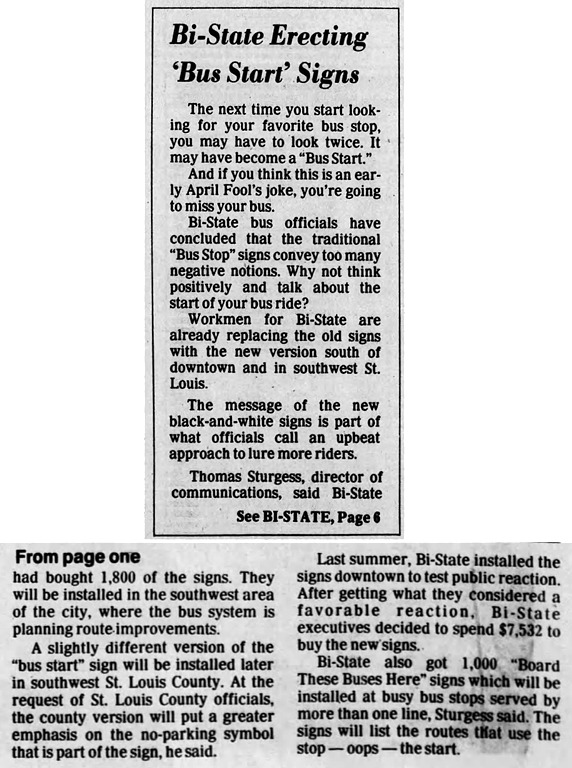
St. Louis Post Dispatch - Mar 28, 1985
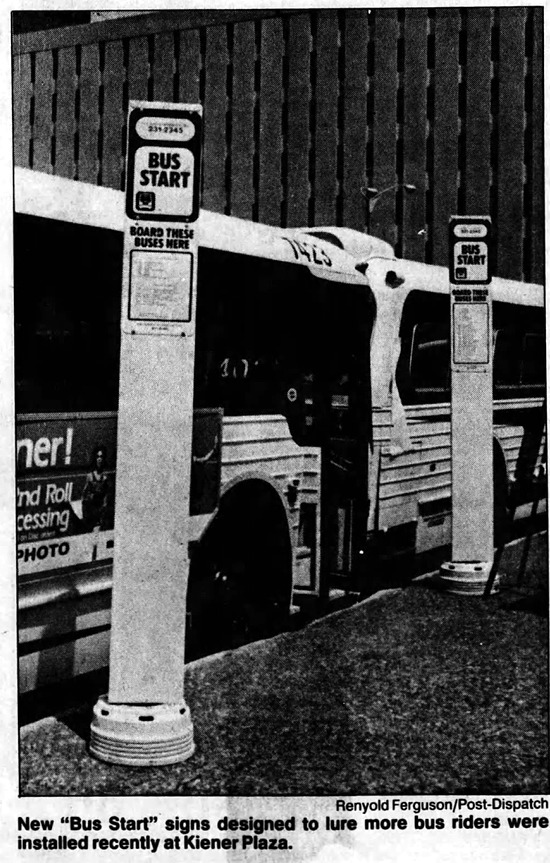
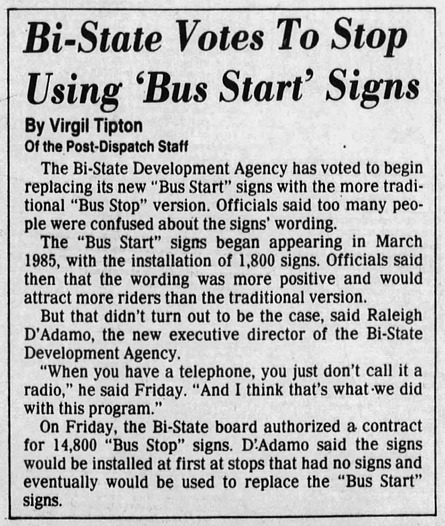
St. Louis Post Dispatch - Aug 24, 1986
Posted By: Alex - Tue Nov 06, 2018 -
Comments (4)
Category: Odd Names, 1980s, Bus
Space Raiders
In some other universe, 2017 saw the release of the tenth film in the SPACE RAIDERS franchise.
Posted By: Paul - Tue Oct 30, 2018 -
Comments (3)
Category: Aliens, Ineptness, Crudity, Talentlessness, Kitsch, and Bad Art, Movies, Science Fiction, 1980s
Expando-Vision
Introduced in 1983 by Stimutech. It was a device that could flash subliminal messages on your TV screen as you watched TV. The maker emphasized the ways this could be put to use for self-help (weight-loss, stop smoking, stop drinking, etc.). But they did sell a "Sexual Invitation" program that surreptitiously flashed messages of seduction: "Sex is OK, Let us make love, I am OK, We share sexually, Let us kiss, Let us caress, Let us be naked, We explore bodies, Let us be together.”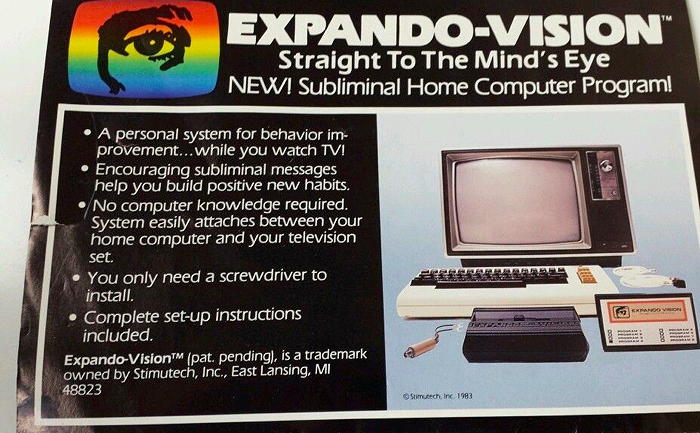
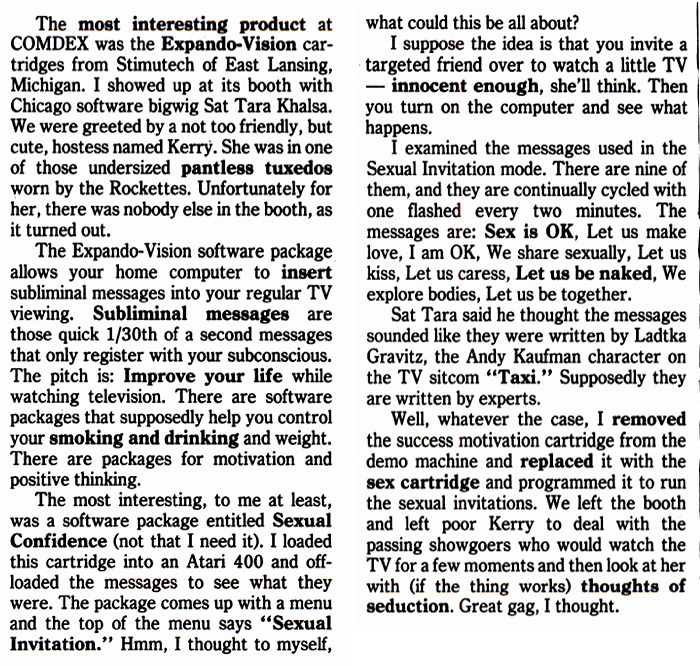
John Dvorak, InfoWorld - Dec 26, 1983

Lansing State Journal - Dec 4, 1983
Posted By: Alex - Fri Oct 19, 2018 -
Comments (2)
Category: Innuendo, Double Entendres, Symbolism, Nudge-Nudge-Wink-Wink and Subliminal Messages, Technology, Psychology, 1980s
Toni’s Boys
A male version of Charlie's Angels that never made it past a 1980 pilot episode. From Wikipedia:
Posted By: Alex - Tue Sep 25, 2018 -
Comments (0)
Category: Television, 1980s
Inductive Nasal Device
Norman Lake's cure for the common cold. Otherwise known as the "IND".More info: Chicago Tribune - Nov 20, 1985
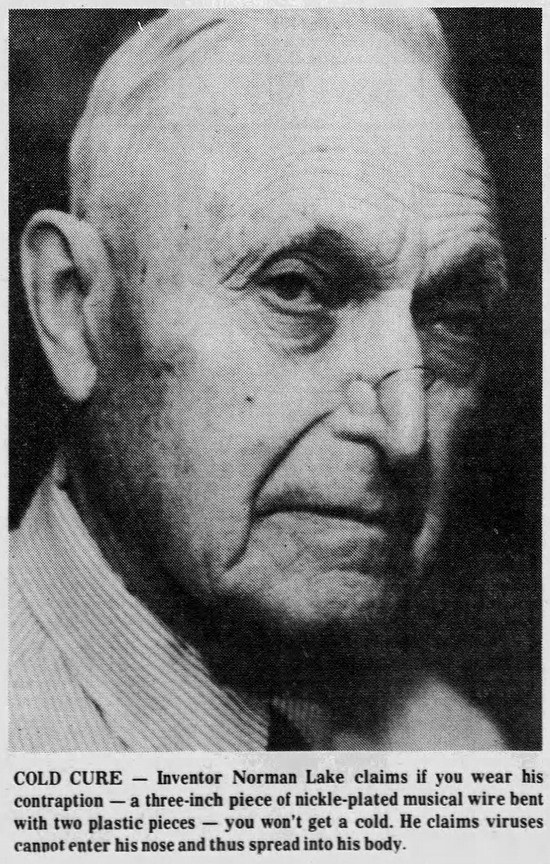
Chambersburg Public Opinion - Apr 23, 1982
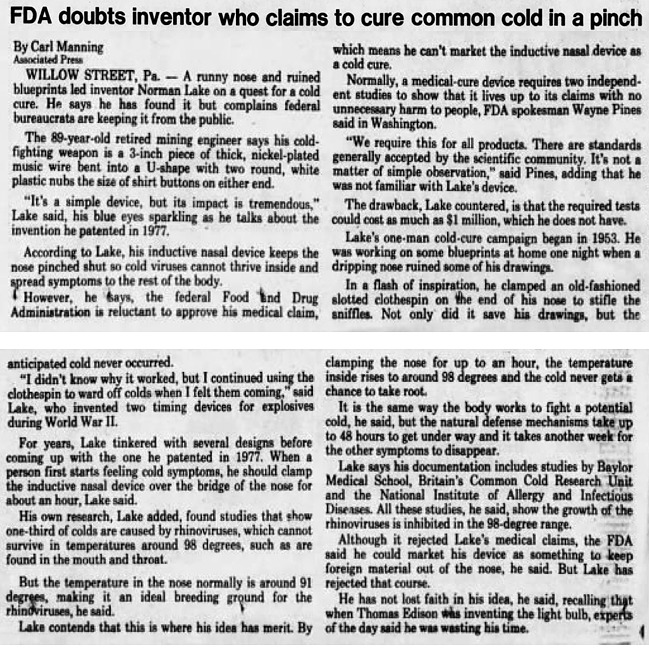
Arizona Republic - May 8, 1982
Posted By: Alex - Mon Sep 10, 2018 -
Comments (1)
Category: Health, Inventions, Cures for the common cold, 1980s
Hero Dog of the Year
In 1954, Ken-L Ration Dog Food began awarding a prize to the "Hero Dog of the Year." Sponsorship switched to Kibbles 'n' Bits at some point.Here is a list of some winners.
The latest year I can find when the award was given was 2004.
The American Humane Society seems to have taken over, or rebooted the award.
In any case, the award gives us a chance here at WU to carry forward one of our earliest missions: proving that cows are the most evil and deadly creature on the planet.
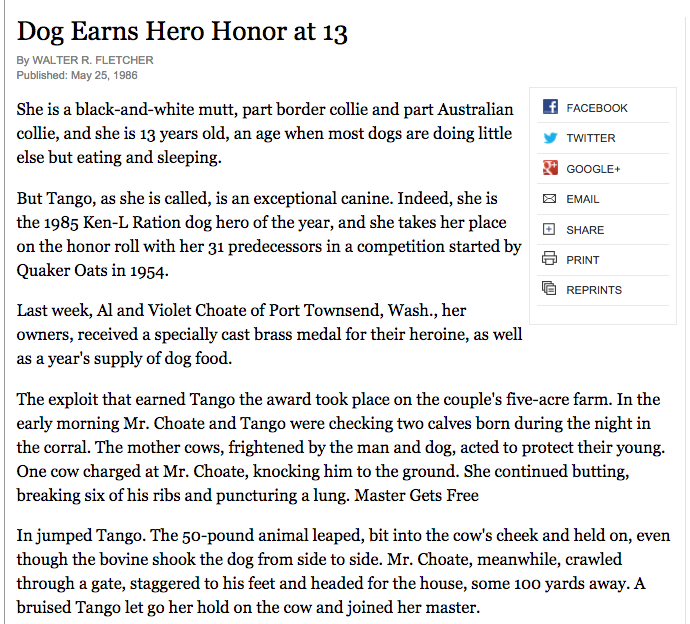
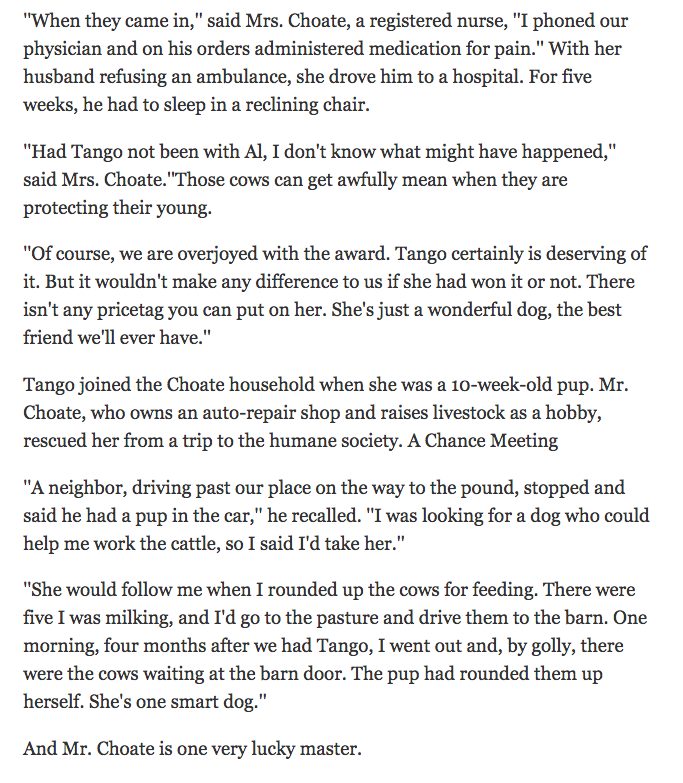
Article behind NYT paywall, alas.
Posted By: Paul - Thu Aug 30, 2018 -
Comments (1)
Category: Animals, Awards, Prizes, Competitions and Contests, Dogs, 1950s, 1980s
Microwaveable Ice Cream Sundaes
Johnston's Hot Scoop Microwave Sundae is one of those products where you have to wonder what was going through the minds of the executives who dreamed it up. Introduced in the mid-1980s, the concept was that it was an entire, frozen ice cream sundae that you could heat in the microwave, and (in theory) only the topping would melt.In practice, the ice cream also inevitably melted, leaving consumers with a soggy mix of ice cream and topping. And yet the company went to all the effort to make this thing because they figured it would be too difficult for people to just heat the topping on its own.
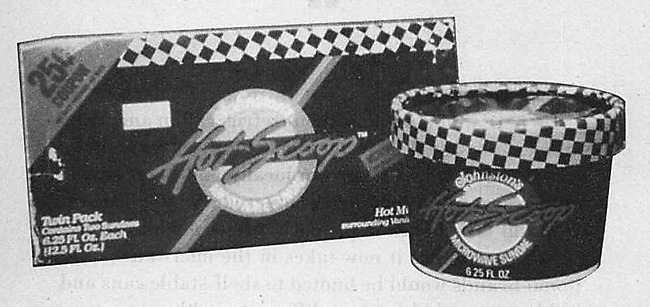
A review of the product:

Minneapolis Star Tribune - July 16, 1986
Posted By: Alex - Mon Jul 30, 2018 -
Comments (4)
Category: Food, Products, 1980s
Frozen Foods
Technically, their business did involve the handling and preparation of meat.
Pensacola News Journal - Nov 10, 1980
And it seems that the Elliot-Hamil Funeral Home is still around. Their website.

Posted By: Alex - Sat Jul 28, 2018 -
Comments (1)
Category: Death, Food, 1980s
Does seltzer water help plants grow?
In 1980, Canfield's natural seltzer launched a campaign to promote its product as being great for watering house plants. It printed on its labels: "We recommend our natural seltzer for house plants."Could there have been any truth to this claim? Is seltzer water actually good for plants? Well, the only vaguely scientific study I can find addressing this claim (after, admittedly, only a brief search) was a student project conducted at the University of Colorado Boulder in 2002. The student researchers concluded, "Plants given carbonated water not only grew faster but also developed a healthier shade of green in comparison to plants given tap water."
So, maybe Canfield's was onto something. However, if you're thinking of treating your plants to some seltzer water, I imagine you'd want to use water at room temperature, not refrigerated. Cold water might shock their systems.
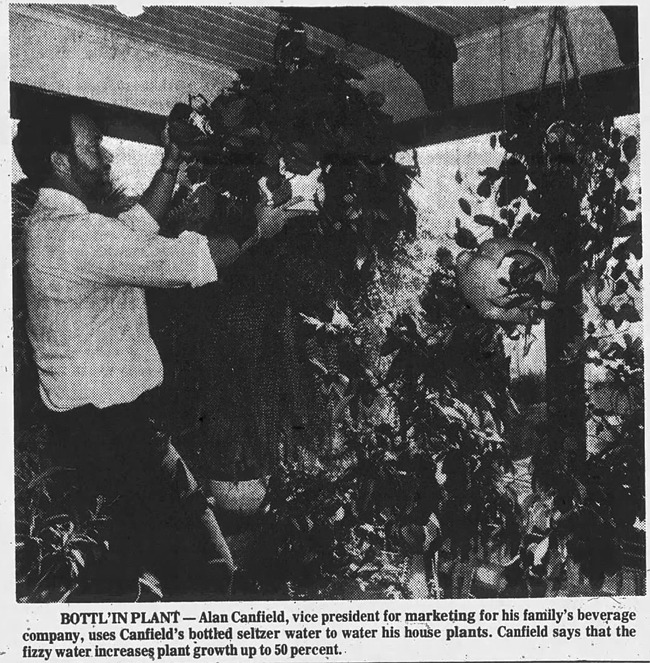
Marysville Journal-Tribune - June 9, 1980
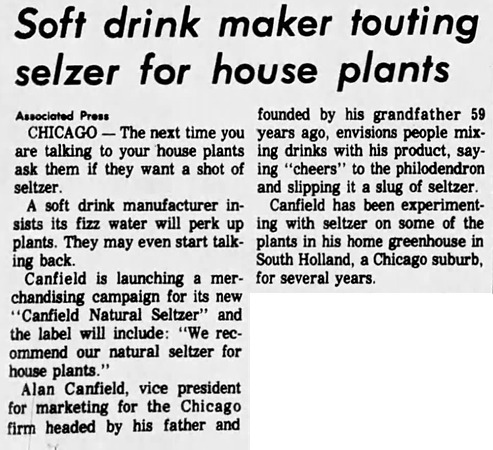
Owensboro Messenger-Inquirer - May 19, 1980
Posted By: Alex - Thu Jul 19, 2018 -
Comments (12)
Category: Nature, Science, Environmentalism and Ecology, Experiments, 1980s

| Who We Are |
|---|
| Alex Boese Alex is the creator and curator of the Museum of Hoaxes. He's also the author of various weird, non-fiction, science-themed books such as Elephants on Acid and Psychedelic Apes. Paul Di Filippo Paul has been paid to put weird ideas into fictional form for over thirty years, in his career as a noted science fiction writer. He has recently begun blogging on many curious topics with three fellow writers at The Inferior 4+1. Contact Us |




